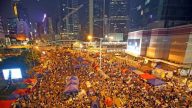【新唐人2014年10月01日讯】香港“占中”行动9月30号进入第三天。当天的白天,“占中”民众的人数虽有减少,但到了傍晚时份,前往各占领区的市民愈来愈多。面对动荡的香港局势,很多人不禁要问,这对香港,甚至对中国大陆来说,会产生什么样的冲击呢。我们一起来看下面的报导。
9月29号早上,香港金融管理局宣布启动紧急应变措施。金融管理局表示,因应中区及其他地区出现的公共秩序情况,已联同受影响银行,启动应变预案,以确保银行体系核心功能的正常运作。金管局还表示,有需要时,会按现有机制,向银行体系提供流动资金支持。
30号早上,金管局发声明说,截至早上9点,共有21家银行的37个分行营业据点受“占中”的影响,而暂时关闭。金管局还说,由于受影响地区不能进行正常运钞及支票交收运作,这些地区的银行自动柜员机服务也将陆续暂停。
香港《开放》杂志总编辑金钟:“整个占中的诉求就是争取香港未来的特首的选举,能够真正的做到公开公平的普选,他们动用武力,催泪弹,80多颗催泪弹拿出来,用这种暴力的手段来镇压手无寸铁的青年学生,就把香港人激怒了,因此昨天星期一,这个占中就变成占领香港了,香港四大商业区都被占领了,都被瘫痪,所以现在这个局势就发展的特别快,而且特别严重。”
据了解,已有多家企业员工响应学联呼吁的罢工行动,包括电讯业的CSL和PCCW及恒生、中银、渣打等银行。美国《华尔街日报》指出,抗议活动打击了香港的金融业。继前一天下跌1.9%之后,香港股市30号早盘下跌1%。触及了两个半月以来的最低水平。
美国南卡罗莱纳大学艾肯商学院教授谢田:“如果占中继续进行,香港很多经济活动、商务活动、金融活动可能都会受到影响。而如果香港金融和香港市场受到冲击,也会直接影响中国的经济和中国的金融。如果事件继续恶化,香港政府拒绝让步的话,占中表示会提高抗争的事态,可能出现全香港的罢市、罢课、罢工,这样的话,会更深刻的影响到香港经济和中国经济。”
投资者学会主席谭绍兴向《德国之声》表示,“占中”行动对金融界的短期影响应该不大,但中共提出的政改方案会给香港的经济带来长远的影响。香港的吸引力其实在于一个“自由”的金融中心。政改以后,很多投资者会考虑,到底香港还是不是那么“自由”,是不是还值得在香港投资。
上海证券交易所日前公布了沪港通规则,有望在10月27号开通,但目前“占中”行动遍地开花,沪港通是否会被延迟或叫停,成为外界关注的焦点。
谢田:“现在看来香港政府有很多活动,政治活动、经济活动都已经停摆,而这个沪港通呢,我看肯定要受到延迟,香港股市都不能正常运作的话,沪港通也没办法进行。”
美国南卡罗莱纳大学艾肯商学院教授谢田指出,不仅中国的经济会受到冲击,如果中共当局不能妥善处理香港的抗议活动,可能导致政权的全面崩溃。
谢田:“虽然中共现在封锁的很紧,非常有限的让老百姓知道一些占中的影响,但是通过互联网等各种渠道,很多消息都会不同程度的进入中国大陆,这对那些对中共统治已经忍不可忍的中国民众来说,可能是一个积极的鼓励和信号,会导致中共政权从香港开始,一直到中国大陆的崩溃。”
有媒体指出,中共领导人习近平正面临艰难的抉择,香港发生抗议活动,如果听之任之,可能会鼓励中国其他地方的人群起效仿,但若中共军队介入清场,大陆民众就会起来支持香港民众,整个“倒共”局势就会一触即发。
采访/陈汉 编辑/陈洁 后制/曜逵
Hong Kong Situation Unsteady, How Much Affect on China?
Sept. 30, numbers of protesters of Occupy Central reduced, but byevening, numbers of citizens joining the event increased. Facing Hong Kong’s unsteady situation, many people questioned:what would be the impact of the event on Hong Kong and Mainland China?
Let’s take a look.
On the morning of Sept. 29, the Hong Kong Monetary Authority (HKMA) took emergency measures. HKMA says that in view of the public order situation in Central and other areas, HKMA and affected banks have activated their business continuity plans to maintain normal operations of core functions of the banking system. HKMA will also inject liquidity into the banking systems as and when necessary under the established mechanism.
On the morning of Sept. 30, HKMA released a statement. It says that as of updated news at 9 a.m., 21 banks and 37 branches were affected by Occupy Central, and have to be temporarily shut down. HKMA says the affected areas couldn’t operate normally, cash machine services will gradually be withdrawn.
Jin Zhong, chief editor of Hong Kong’s Open Magazine: “Occupy Central aims at obtaining future universal suffrage for the chief executive. Thus election should be achieved genuinely, openly and fairly. The police used brutal suppression and over 80 tear gas rounds to attack young unarmed students, arousing Hongkongers’ anger. From Monday yesterday, the Occupy Central became Occupy Hong Kong. Four major business areas were occupied, the systems in the areas were collapsed. So the current situation developed very fast, very serious.”
Sources say that staff of several companies echoed the students’ strike. This includes CSL, PCCW, Hang Seng Bank, Bank of China, Standard Chartered Bank and more. The Wall Street Journal reported that the protest affected Hong Kong’s financial sectors. The stock dropped 1.9 percent one day earlier, today’s stock dropped 1 percent. It reached its lowest for two and a half months.
Frank Xie, Professor of Business School, University of South Carolina Aiken: “If Occupy Central continues many economic, commercial and financial events will be affected in Hong Kong. If Hong Kong’s financial and market are affected, it will directly influence China’s economy and finance. If the incident gets worse, Hong Kong authority refuses to make a concession, Occupy Central says they will upgrade the protests, likely the whole of Hong Kong will be on strike. In this regard, it will further affect Hong Kong and China’s economy.”
Tam Siu-hing, Chairman of Hong Kong Institute of Investors told DW that Occupy Central will not greatly affect financial sectors in the short term. But China’s political reform plan would affect Hong Kong’s economy in the long term. Hong Kong’s attraction is linked to freedom of its financial center. After the political reform, many investors will wonder whether Hong Kong is free? Or is it worth to invest in Hong Kong?
Shanghai Stock Exchange released Shanghai-Hong Kong Stock Connect program. It is expected to be implemented on Oct. 27. However, will Occupy Central movement delay or stop the Stock Connect? It becomes a concern to observers.
Frank Xie: “Hong Kong government has many activities. Political events and economic events have stopped. Regarding the Stock Connect, it likely would be postponed. Hong Kong’s stock market couldn’t operate normally, the Stock Connect would be the same.”
Frank Xie points out that not only China’s economy would be affected, if the regime cannot handle the protest properly, it also would cause the Chinese Communist Party’s (CCP) power to completely collapse.
Frank Xie: “Although China blocks information tightly, and Chinese people have very limited information about Occupy Central’s influence; through various channels ie the internet, news has reached Mainland China. For Chinese citizens who can no longer tolerate CCP rule, it could be a positive encouragement and signal. It could start from Hong Kong then to Mainland, CCP’s rule will collapse.”
Some media report that Xi Jinping is facing a difficult choice. Regarding Hong Kong’s protest, if they let it be, it could encourage Chinese people to follow. If the CCP army intervenes, Mainland Chinese would stand up to support Hong Kong people. The movement of “down with the CCP” would be triggered at any moment.
Interview/ChenHan Edit/ChenJie Post-Production/YaoKui



















